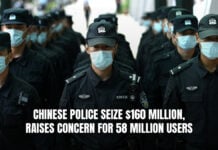
China Central Television’s (CCTV) financial channel program ‘Economic Half-hour’ released a special report yesterday (8) on PlusToken and its devastating financial fraud scam of over 40 billion renminbi in capital market, affecting more than 2 million victims across 100+ countries in just a year. The investigation also revealed that Leo, the co-founder of PlusToken, was not what he claimed to be, and there was the mastermind, Lu Moulong, behind the scenes.
CCTV-2 “Economic Half-hour” Alerts Public to Staggering $40 Billion PlusToken Scam
The exceptionally intricate case of PlusToken, a pyramid scheme perpetuated through millions of victims across a hundred countries, was highlighted in a special report on China Central Television’s (CCTV) financial channel ‘Economic Half-hour’ this week.
The swindle was brought to light following a first-instance judgment on the public prosecution case of Plustoken by the Procuratorate of Yancheng Economic and Technological Development Zone, Jiangsu Province – totalling a staggering 12 billion yuan (US$1.7 billion) in fraudulent funds transferred through cryptocurrency exchanges in and out of the country.
Merely months before the indictment, the scam had been advertised as a new opportunity, primarily through social networking websites, that promised investors static and dynamic income totaling 6-18% in the PlusToken digital currency of the same namesake. Enticing users with the possibility of economic growth, a substantial sum of approximately 500 US dollars of Bitcoin (BTC), Ethereum (ETH), and other tokens were invested in the scheme at inception.
The masterminds behind the fraudulent enterprises were brazen enough to borrow attributes of success, constructing a phony corporate identity with presumably “expert” and experienced personnel. Particularly, Leo, who purported to be a former Google AlphaGo (AlphaGo) algorithm researcher, in reality, was nothing more than a foreign student enrolled at a university in Changsha, Hunan, and travelled to China in September 2015 with that guileful narrative.
These lies eventually backfired when their elaborate structure began to crumble. Thanks to their extensive documentation and coordination of activities through the international messaging service, Telegram, authorities were able to track and identify the criminal syndicate shortly after the misappropriation of funds.
After unravelling the mysteries of their associations’ whereabouts, the overwhelming majority of the suspects responsible for the laundering had received commissions for the transactions, ranging from 5-50% for every successful transfer of USDT into Chinese Yuan.
In spite of their efforts, the Chinese police were triumphant in the end and the state announced it had brought to justice sixteen of its prominent fraudsters. Among these individuals was Lu Moulong, allegedly the perpetrator responsible for engineering Leo’s false identity; currently facing several years in jail and millions of Chinese yuan in fines that have already been forfeited to the state.
It goes without saying that the zero-tolerance policy towards these kinds of criminal activities has been broadly enforced in China – but also every other region where PlusToken is still affecting its victims.
A bountiful number of countries across the world, including Japan, Australia, the United States, and Taiwan among others, have since begun adapting their currencies to a digital structure for the sake of their nation’s safety and economics. This movement is the culmination of decades of experience in the field of money-laundering, and a clever transition towards more profitable financial exercises.
In the Chinese region of Inner Mongolia has proven to be an exemplary venue when it comes to these financial modifications – post-cancellation of the mineworkers in April 2021, due to the low energy costs; the miners then migrated to Kazakhstan and the United States.
Nevertheless, the crypto clandestineness is still being utilized and it’s speculated that a massive flow of private investments from the People’s Bank of China (PBOC) into the economy is projected to catalyse a new bull market in the cryptocurrency industry within the next few months. Another apparent example of the ‘experiment zone of crypto development’ is the Hong Kong government, who have shifted their attitude towards the asset, and committed to providing a legal framework for its retail use from Jun. 1.
You can’t simply discount the reality that digital startups have been treading on thin ice for the past few months with such high fluctuations in the market and so strict regulations in the coin universe. Yet, the recent shootings of prices in Chinese coins – like Neo, Conflux, and Flamingo – that compounded volumes of more than twenty percent overnight serve as a reminder of the erratic and volatile nature of the cryptocurrency environment.
Perhaps, in the long run, governments who are willing to take a risk on the young but powerful technology will be those who benefit the most.
So, maybe it’s time to protect your wallet and reassess your cryptocurrency investment.
Just be sure to do your own research subject to knowledge of the industry’s climate – and it’s potential dangers.



